 This has been a very hard time for many of us, from the staggering sadness of the spreading Covid virus (and the polarization it is causing, in part due to Mr. Trump’s minimizing the dangers and not offering public empathy to those who have lost loved ones. Yes, I am bitter.) The election has been hard for most of us, and we were biting our nails here in PA, believe me. I’ve spent a lot of time these past few weeks in long and detailed debates via email and it has been terribly discouraging. I’ve not been at my best, always, but even while saying directly that I seek nuance and fairness, I have been accused of being a brute. We knew we’d lose customers over our Biden sign (although we didn’t expect to be cussed out by a charismatic lady or receiving what can only be characterized as hate mail.) I did not expect to lose friends I have known for three decades, but there it is. These are sad times for all of us.
This has been a very hard time for many of us, from the staggering sadness of the spreading Covid virus (and the polarization it is causing, in part due to Mr. Trump’s minimizing the dangers and not offering public empathy to those who have lost loved ones. Yes, I am bitter.) The election has been hard for most of us, and we were biting our nails here in PA, believe me. I’ve spent a lot of time these past few weeks in long and detailed debates via email and it has been terribly discouraging. I’ve not been at my best, always, but even while saying directly that I seek nuance and fairness, I have been accused of being a brute. We knew we’d lose customers over our Biden sign (although we didn’t expect to be cussed out by a charismatic lady or receiving what can only be characterized as hate mail.) I did not expect to lose friends I have known for three decades, but there it is. These are sad times for all of us.
Perhaps you are pondering, maybe in lament like Jeremiah in this Rembrandt piece, painted, we are told in 1630.
Besides the wildest, funniest authors you can find to enjoy, what might we be reading this season to shape and inform us to be better peacemakers, repairers of the breach, forthright and honest but civil, at least? How can we be wise leaders in this new era of American life? What resources might help us understand, at least a bit more, and, as the kids say, “speak into” this hot mess?
I’m glad you asked. Here is my list of 21 good ones. A few of these I’ve highlighted before, most I have not. May these help us all be the kind of people we ought to be, appealing to, as Lincoln said in his first inaugural, “our better angles.” Buy a few and spread the good words. Maybe kickstart your process by creating a small reading group with some friends on Zoom. (Tell them to order their books from us!)
Thanks for your support of our family biz here in Dallastown, for caring about the printed page, for being among those who still believe that “the pen is mightier than the sword.”
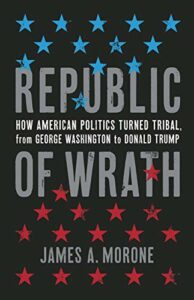 Republic of Wrath: How American Politics Turned Tribal from George Washington to Donald Trump James A. Morone (Basic Books) $32.00 OUR SALE PRICE = $25.60
Republic of Wrath: How American Politics Turned Tribal from George Washington to Donald Trump James A. Morone (Basic Books) $32.00 OUR SALE PRICE = $25.60
Okay we’ll start here, just for fun. Fun and maybe enough history to save you from developing an ulcer or having a heart attack. Really — I started this several weeks ago and the long and very informative introduction gave me enough to chew on to allow me to stop fuming at least a little bit. Republic of Wrath is written by one of our esteemed, premier historians and here he offers more in-depth history from across the American centuries than you could imagine. This guy is so amazingly fluent in so, so much, it is a grad school course in one stimulating, 400+ page book. Morone reminds us that, if I may paraphrase, “we’ve been here before.” We’ll get through this.
Yes, what one author has called our “enduring cleavages” (such as black vs white, native vs immigration) have become “dangerously revivified in the present era” so this is not trivial. Partisan tribalism has been bad and it getting worse in our lifetime. Morone combines history and political science to help us understand where we’ve been and what to do about it. Some of the stories in our past are pretty outstanding, if you like the WWF. Who knew?
The reviews of this have been stellar and I want to show you several because they prove how esteemed this author is, how good this book is, and why I want to recommend it as a valuable history lesson. I think it could be, as Eric Alterman put it, “an important intervention at a pregnant political moment.”
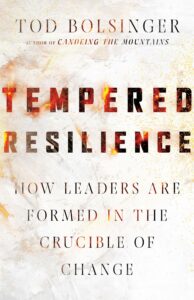 Tempered Resilience: How Leaders Are Formed in the Crucible of Change Tod Bolsinger (IVP) $24.00 OUR SALE PRICE = $19.20
Tempered Resilience: How Leaders Are Formed in the Crucible of Change Tod Bolsinger (IVP) $24.00 OUR SALE PRICE = $19.20
(There is an 8-week study guide as well, for $10.00; our sale price for the leader’s booklet is $8.00. If ordering this from us, please indicate if you also want the study guide.)
I would suspect that many who follow BookNotes know that Tod Bolinger’s previous book about Christian leadership, Canoeing the Mountains, was a hugely popular book in many quarters. It was discussed in churches, businesses, para-church ministry settings, nonprofits and was excellent for anyone who wanted to be more wise about navigating challenging terrain, or, as the subtitle put it, “uncharted territory.” (Yep, Lewis and 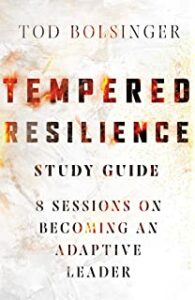 Clark expected to be able to use those canoes and had no idea they’d have to carry them over mountains unlike anything they’ve ever seen. No wonder it was such a winner of a book in our fast-changing years of the new millennium.)
Clark expected to be able to use those canoes and had no idea they’d have to carry them over mountains unlike anything they’ve ever seen. No wonder it was such a winner of a book in our fast-changing years of the new millennium.)
And, now, this. Polarization like we’ve never seen, alt-right militias on the rise, protests in the streets, Covid, a sizable portion of our fellows believing the President’s claims that an election was rigged. What in the world does in look like to canoe the mountains, now? Even if we are eager to be creative in creating fresh and nimble organizations for these uncharted times, what kind of leaders can hang in there, doing that? Our moment demands what is called “adaptive change.” What are the qualities of adaptive leadership, especially within churches and nonprofit organizations? Even beyond those who are leaders of their local churches or other organizations (who will find this useful) I think any of us who care about the public square and want to be some kind of influencer in the world around us, Tempered Resilience is going to be significantly helpful.
Bolsinger writes: “To temper describes the process of heating, holding, hammering, cooling, and reheating that adds stress to raw iron until it becomes a glistening knife blade or chisel tip.” A the publisher notes, “When reflection and relationships are combined into a life of deliberate practice, leaders become both stronger and more flexible. As a result, these resilient leaders are able to offer greater wisdom and skill to the organizations they serve.
Tempered Resilience is brand new, the eagerly awaited sequel to Canoeing the Mountains. Spread the word that we have it at 20% off and hope we sell ’em. Folks need this, Here are just two quotes from the many early reviews :
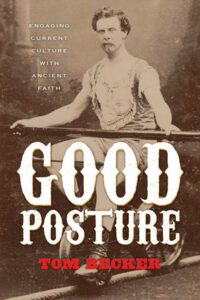 Good Posture: Engaging Current Culture with Ancient Faith Tom Becker (Square Halo Books) $16.99 OUR SALE PRICE = $13.59
Good Posture: Engaging Current Culture with Ancient Faith Tom Becker (Square Halo Books) $16.99 OUR SALE PRICE = $13.59
We have told you before about how we so appreciate Rev. Tom Becker and his cool Row House mission in Lancaster, PA where he embodies civic engagement, culture-making, hospitality and creativity by artfully hosting what he calls Forums — programs, conversations, events, creating space to build friendships over shared concerns from sustainable farming to enjoying popular culture. In Good Posture, Tom backs up and shows his theological and cultural perspective that serves as the framework for his creative programing. He’s wise and helpful (and loaded with good stories) of how to have a good posture, leaning in to artful cultural engagement, being a faithful presence and (as it says on the back cover) “embracing wonder in a cynical world.” Our reflexive posture doesn’t have to be leaning out, being judgmental, being fearful, being holier-than-thou. We can offer wonder and grace.
Do you see the old-fashioned picture of the tightrope walker on the cover? What a hoot! I’m sure some of us who are trying to bridge political and culture war divides feel like that guy up there, getting blasted by the winds coming from several directions at once. It takes some special lessons in good posture to be able to walk that tightrope and this book not only reminds us, but shows us how to do it without falling off either side to certain disaster. I thought I was pretty good at it, actually, but these days have proven otherwise. Most of us need Tom’s help. This is a fun little book, packed with guidance about communicating well with a culture that just might be hungering for this kind humanity rooted in the deepest truths of ancient faith. There is a great discussion guide in the back and a few solid reading suggestions for each unit. I like this primer a lot and it might inspire you and your community to try some new approaches to being missional and engaged with good posture in your own community.
 Speaking Peace in a Culture of Conflict Marilyn McEntyre (Eerdmans) $21.99 OUR SALE PRICE = $17.59
Speaking Peace in a Culture of Conflict Marilyn McEntyre (Eerdmans) $21.99 OUR SALE PRICE = $17.59
It is hard for me to do a talk on the power of books and the spirituality of the reading life without citing Marilyn’s nearly classic 2009 release, Caring for Words in a Culture of Lies (Eerdmans; $19.99) where she offers what she calls “stewardship strategies” to help us steward words well. It is a gem of a book, a little masterpiece and it reminds us that being careful about words can help us resist hype and spin and propaganda. More literary and offering more elegant joy than the rigorous (but also must-read) How to Think: A Survival Guide for a World at Odds by Alan Jacobs, say, Caring for Words is a book I highly recommend, often, to nurture the Christian mind.
And then, this summer, Eerdmans released what seems nearly to be a sequel to Caring for Words, namely, Speaking Peace in a Climate of Conflict and it is wondrous. This is not your typical book about civility — I will name a few of those momentarily — as it really isn’t only about peacemaking or reconciliation efforts. Some of the chapters are fairly directly about that (“Quit Trying to Win” for instance) but there are other themes developed in chapters with captivating titles such as “Unmask Euphemisms”, “Embrace Your Allusive Impulse”, “Complicate Matters”, “Remind People of What they Know.” In a way, it is about “speaking the truth in love” as the Bible says, nearly a handbook for speaking up well.
Indeed, there is a chapter called “Articulate Your Outrage” and another called “Find Facts and Check Them” and, then, one called “Laugh When You Can.” It almost sounds like it is for those of us who do get in heated conversations a lot, or who feel the should. (At moments, it made me think of the very helpful Raise Your Voice: Why We Stay Silent and How to Speak Up by Kathy Khang.) Still, it is artful and literary and so enjoyable for anyone who loves good writing. Poets among us will love her reflection on “telling it slant” and will cheer for the chapter, “Promote Poetry.” Speaking Peace… is a bit more fiesty than some books about resisting conflict with civility and even a bit more passionate about public life than what was already heavy Caring for Words… Speaking Peace is a book we need, now, now more than ever. Marilyn McIntyre is a model and wise guide, an ally.
And here is one thing that is fabulous: McEntyre does all this by drawing on exemplary authors, writers she likes, lines she loves, books and essays and poems that have given her endurance and voice, that serve as models for what we are talking about here.
Who wouldn’t want to know which great writers are considered commendable by somebody as expert as lit prof Ms McEntyre? Who couldn’t benefit by having her tell you who to read and why? For lovers of words, book lovers, those who care about reading wisely, this book is a gem. But more, it is equipping us all to the vocation of using words well for the common good.
We have quoted this wonderful back cover blurb by Leslie Leyland Fields before, and I’ll share it here, again, hoping it inspires you to want to sit under the tutelage of this wonderful little book. I need it. Do you?
It’s commonplace to lament the loss of civil discourse, but few do anything about it. For years, Marilyn McEntyre has been quietly shepherding us toward God’s intention of language as a gift rather than a weapon. She’s done it again. We need her brilliantly crafted words more than ever to show us again how to speak, live, and act in accord with the beautiful gospel.
— Leslie Leyland Fields
author of Your Story Matters: Finding, Writing, and Living the Truth of Your Life
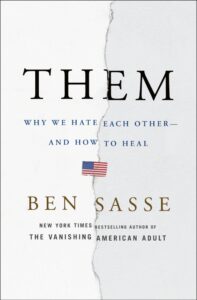 Them: Why We Hate Each Other — And How to Heal Ben Sasse (St. Martin’s Griffin) $17.99 OUR SALE PRICE = $14.39
Them: Why We Hate Each Other — And How to Heal Ben Sasse (St. Martin’s Griffin) $17.99 OUR SALE PRICE = $14.39
I know there are some of my left-leaning friends (heck, even moderate, centrist friends) who think Senator Sasse voted with President Trump’s revolutionary right agenda way too often. And, because he has called for civility and decency, some Trumpers think he’s a weak-kneed sell out. I don’t like Mr. Sasse’s voting record, but I love listening to his reasonable rhetoric and I love reading his fine books. Like him or his other books or not, Them is a great, great read, and it offers true insights and important things to consider if we are to move forward.
Look: our precious image of ourselves — those of us who don’t see ourselves as hostile or ideologically extreme, as decent and civil and persuasive — isn’t going to cut it. I began to realize that when we got death threats from the KKK decades ago. It’s a complicated and hard world and aw-shucks, good-natured idealism and even Jesusy charm, are not enough, especially not now after this very close election. We really do have to understand each other more and we need to realize our significant malaise and what is often behind it. We need more than to reach across the aisle, we need to pay attention to real places, to our rootlessness. We have to explore the loneliness crisis, ask why folks find themselves so alienated. We have to dig in — buy a cemetery plot, Sasse suggests — and connect with our communities.
This book will help us along the way to a more civil society. But it is a more sustainable, lasting solution, not just being nicer in public. Sure, more tolerance and better manners wouldn’t hurt, but this is trying to get at deeper issues and part of that is our rootlessness.
Sasse is an excellent writer, unpretentious, thoughtful, and at times, quite funny… even if you disagree with some or all of what Sasse writes, it’s an interesting book and his arguments are worth reading — as are his warnings about what our country might become. -NPR
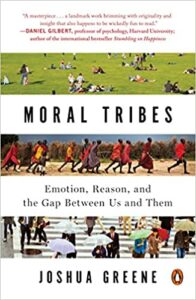 Moral Tribes: Emotion, Reason, and the Gap Between Us and Them Joshua Greene (Penguin) $20.00 OUR SALE PRICE = $16.00
Moral Tribes: Emotion, Reason, and the Gap Between Us and Them Joshua Greene (Penguin) $20.00 OUR SALE PRICE = $16.00
This is a hefty and serious read, now out in paperback, that came recommended to me by a splendidly thoughtful Christian friend who is a doctor, health-care policy wonk, and active Christian citizen. I likened it at first blush to the important The Righteous Mind: Why Good People Are Divided by Politics and Religion by Jonathan Haidt (who, like Greene, weaves together stories and research, combining political science, sociology, and brain studies.) Greene is, himself, a neuroscientist. Here is the pathbreaking thesis described in a pithy way on the back cover: Moral Tribes… “reveals how our social instincts turn “me” into “us,” but turn “us” against “them” — and what we can do about it.
Greene assumes that our modern times have had an unsettling impact in forcing the world’s tribes into shared space, resulting in “epic clashes of values along with unprecedented opportunities.” That is, “as the world shrinks, the moral lines that divide us become more salient and more puzzling.” Why do we fight over everything from tax codes to gay marriage to global warming?
I am not at all sure this guy is right — heck, I’m not sure my skim-through allowed me to fully understand it. He offers maxims for “navigating the modern moral terrain” and offers this as a practical road map, so to speak, showing us a wise sort of use of our reasoning abilities. He brings in a lot of philosophy (which he seems to know well) and psychology and proposes sort of an evolutionary morality. (Yikes, I know.) Please, fellow Christians, don’t jump on me for suggesting this: it’s a fascinating read, called “superb” by the Wall Street Journal and “Surprising and remarkable” by the Boston Globe. Seven Pinker likes it as does Peter Singer (just saying.) Listen to this blurb:
A masterpiece.. a landmark work brimming with originality and insight that also happens to be wickedly fun to read.” –Daniel Gilbert, professor of psychology, Harvard University, author of Stumbling on Happiness
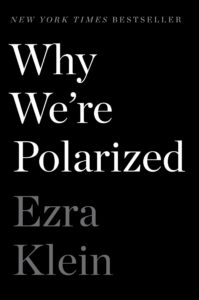 Why We’re Polarized Ezra Klein (Avid Reader Press) $28.00 OUR SALE PRICE = $22.40
Why We’re Polarized Ezra Klein (Avid Reader Press) $28.00 OUR SALE PRICE = $22.40
I’ve been wanting to read this big book during our hard winter and summer and then in the fall of our discontent but just haven’t gotten to it. It seems wonky and complicated to me, but yet some reviewers have insisted it is accesible and quite readable. One notes that is it like the “Explainer” series at Vox which Klein co-founded. Even Oprah gushed about how much she learned. Emma Levy of the Seattle Times explains it thusly: “By weaving together a composite of group psychological theory and political history in the trademark, rigorously logical style of Vox’s Explainer series, Klein traces the path of polarization from a time when the Republican and Democratic parties were virtually indistinguishable from each other to today.” Chris Hayes (author of A Colony in a Nation) says that you will argue with it, you won’t forget it, and it is “absolutely crucial for understanding this perilous moment.”
Others have raved — from Krista Tippitt to Francis Fukuyama to Fareed Zakaria — about this thoughtful exploration of the history of American political tensions and how journalism works in tandem with political shifts; it is working to do what we want it to, Klein says, drawing you in to see what he means.
Listen to what Jonathan Haidt says. (Haidt, who I mentioned above, is the professor of Ethical Leadership at New York University and coauthor of The Coddling of the American Mind and the author of the very relevant The Righteous Mind.) He says of Why We’re Polarized,
Something has gone terribly wrong with American politics in the last decade or so, and Klein gives us the clearest and most comprehensive analysis I have seen. He shows how we entered the realm of political ‘mega identity politics,’ and how feedback loops between our tribal psychology and our rapidly evolving media ecosystem may be driving our democracy over a cliff. The book reviews so many studies that in lesser hands it would earn the label ‘wonkish,’ but Klein’s writing is so good that it is a joy to read, even as you experience a range of negative emotions from what you are reading.”
This is the kind of stuff, I think, we will have to more deeply understand if we are going to help repair the breach and offer healing insight in the midst of our current cultural moment. Looks important, eh?
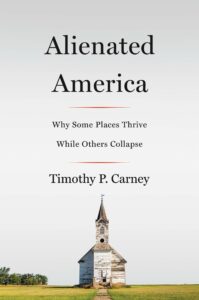 Alienated America: Why Some Places Thrive While Others Collapse Timothy Carney (Harper) $17.99 OUR SALE PRICE = $14.39
Alienated America: Why Some Places Thrive While Others Collapse Timothy Carney (Harper) $17.99 OUR SALE PRICE = $14.39
This is one of the most important books in this genre that I read all year — I couldn’t put it down. It’s a really great read, interesting, captivating, even, at times. Carney is asking, through crunching lots of numbers and citing lots of sources, why it is that when factories close or hard times hit (and he explores several key places, including a Western Pennsylvania rust-belt town near where we used to live as the mill started closing in the early 1980s) some communities are able to thrive and some do not. Some communities are resilient and some aren’t.
The answer that he explores is not just about how areas form community and cultivate resilience but is also backstory to the rise of the sort of populism that fueled the early days of the Trump campaign (among those who did not experience that sort of community and resilience.) The answer provides a healthy vision of hope that comes from friends and connection and civil society. That is, those places that are able to thrive even when factories close are those that have some strong social fabric; again: friends, connections, institutions, places and things to care about. Most people don’t have much “social capital” these days since they don’t get involved much in the way of civic engagement and, as Robert Putnam famously showed, people are “bowling alone.” This is part of Carney’s realization, just how right Putnam still is. But there is more.
Over and over Carney’s narrative takes us to hard scrapple places and the one place where community and support and the experience of “third places” are robust, where people find solace and encouragement and social capitol and learn the capacity for resilience, these days, is (get this…) in communities with churches. That is, those communities that tend to have good and healthy faith communities are more stable, even when hard times hit. (He does not mean it in a shallow or glib way, but he quips that social scientists and community leaders should worry less when a factory closes and worry more when a church closes!)
Alienated America takes us to a lot of towns, but Carney hangs out at several and invites us with him as readers to join him at the local diner, the bus stop, the shop floor, the downtown bar, the church potluck. It is enlightening as he learns that poorer towns, like a largely Lutheran village in MN and a Dutch Reformed one in Iowa and Mormon communities in NV, made up of conservative Republicans, in the 2016 primaries did not vote for candidate Trump. Why? They didn’t like his talk about the American Dream being dead. That is — get this! — they had hope, even though they were in devastated communities.
He notes that if we want to know how financial struggles and poverty hit people we should care as much about church closings as factory closings, and learn more about social capitol and friendship networks. (And, again, in an era when we have less involvement in grange and unions and social clubs and PTO and Little League and Rotary and scouting, church is the one place for live-giving relationships to be nurtured, mentors to be found, friends to be discovered, families to be formed.) He works for the American Enterprise Institute so is an ethically minded, morally serious, social conservative and draws on Putnam, Murray, et al. I liked this book a lot as a glimpse into real towns and places and how they are coping. Alongside other ethnographies and memoirs about hard times in America, this is a great glimpse of a multi-dimensional answer based on more social capital through renewed civil society. (Another book that I read recently in this sort of genre is a study of a coal town in the NW edge of central Pennsylvania, We’re Still Here: Pain and Politics in the Heart of America by Jennifer Silva (Oxford University Press; $24.95.) It’s a bit more scholarly, but fits with the theme of the much-discussed, beautiful book set near Lake Charles, Louisiana, Strangers in Their Own Land: Anger and Mourning on the American Right by Arlie Russell Hochschild (New Press; $17.99.))
A key takeaway at least in the years of his research early in the Trump era he found that religiously oriented (that is, parts of what we now refer to as “white evangelicals”) Republican voters disapproved of Trump early on, but not mostly because he was a divorced New York playboy, as you might think, but because they didn’t resonate with his anger about American. They did not live with an existential sense of alienation even if they were facing economic hardships. Again, this is one slice of the research, one lesson to learn, focusing on the social benefits of faith communities, the need to avoid purely materialistic analysis, and to explore where people live, their sense of place. This is a very entertaining and valuable work.
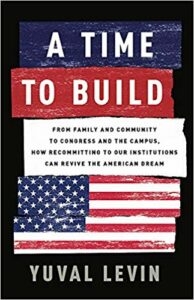 A Time to Build: From Family and Community to Congress and Campus, How Recommitting to Our Institutions Can Revive the American Dream Yuval Levin (Basic Books) $28.00 OUR SALE PRICE = $22.40
A Time to Build: From Family and Community to Congress and Campus, How Recommitting to Our Institutions Can Revive the American Dream Yuval Levin (Basic Books) $28.00 OUR SALE PRICE = $22.40
Back in February or early March, when the snow was still on the ground and we hadn’t yet closed our store, I began this book and was awestruck with its wisdom and how it seemed, as Peggy Noonan put it, “exactly what American needs right now.” It is, she says, “A moving call to recommit to the great project of our common life.” Well, little did we know how bad it was about to get, with deepening polarization, the Covid crisis, the death of George Floyd, the legitimate uprisings and the terrible looting, the (mostly) white pushback, and the President in the thick of it all, using pepper spray and worse to clear away protesters so he could take a picture of himself holding a Bible. Oh my, things went downhill fast and if Yuval Levin’s reasoned voice as a moderate public intellectual was needed early this year, his book is nothing short of a Godsend, now.
A Time To Build is a bit of a manifesto, a guidebook sequel to the more incisive and intellectual The Fractured Republic: Renewing America’s Social Contract in the Age of Individualism. Levin knows well the different philosophical streams running down through American history. (An earlier book was The Great Debate: Edmund Burke, Thomas Paine, and the Birth of Right and Left.) His conservatism is not the sort of a know-nothing Jerry Falwell or mean-spirited Franklin Graham nor a Trumpian power monger who doesn’t think twice about re-tweeting messages from the alt-right and KKK. No, this is an exquisitely thoughtful and perceptive sort of traditionalism that wants to renew institutions and help communities flourish. It cares about the first things of our Republic and honors some of the best ideals of the American experiment.
One may not agree with all of his proposals, but to read a call to be involved at the local level, to enter into community projects — from supporting local schools and local politics to charities and nonprofits –and to care about your own actual neighbor is so inspiring. It is not the full story, but it is a good aspect — rebuilding and repairing our social architecture.
List well to Bruce Reed (himself chief of staff to former Vice President Joe Biden):
Yuval Levin stands athwart the wrecking ball of anger that is smashing a democracy in desperate need of rebuilding and repair. A Time to Build sets forth an ambitious blueprint for how Americans can work together to strengthen broken institutions we cannot live without.
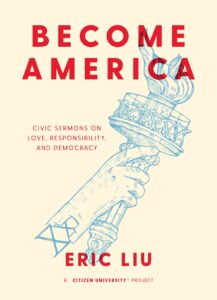 Become America: Civic Sermons on Love, Responsibility, and Democracy Eric Liu (Sasquatch Books) $24.95 OUR SALE PRICE = $19.96
Become America: Civic Sermons on Love, Responsibility, and Democracy Eric Liu (Sasquatch Books) $24.95 OUR SALE PRICE = $19.96
I want to say something important before I commend this inspiring collection of sermons of civil religion. I oppose civil religion. I hate any idol that attempts to replace Yahweh, the God of Abraham and Sarah, Miriam and Moses, Jeremiah and Jesus. Nothing can stand against the Kingship of Christ. I am not fond of Christians overstating our loyalty to any political party and have been confused that some have recently accused me of “baptizing” some secular humanistic party (as if they aren’t all pretty much secular and humanistic.) No, I’m not a fan of what we call civil religion, which is a weak alternative to Biblical religion.
In a pluralistic culture, justice means making room for all, so I’m deeply committed to pluralism and celebrate earnestly the goodness of the American ideals and (some of) the ideas of the Founders. But let’s be clear: for followers of Jesus, no religious-like commitment to any good ideology (environmentalism, radical reconciliation, Federalism, capitalism, conservatism, progressivism, Americanism) should become an idol. Lovely American idealism is a great thing, but we dare not wrap our Bibles in the flag or allow patriotism to distort our faith in Christ’s teachings. And we Americans, oddly, have a problem with this temptation more than most people who do not live in such an impressive Empire. (I have heard that most Christians all over the world are appalled that their brother and sisters in Christ in the US actually put their national flags in their sacred worship spaces. I agree with them: it’s a weird and dangerous custom.)
Having said that, I so, so enjoyed this book and was deeply moved by its thoughtful author and his work at what he calls Citizen University. Eric Liu is, I guess it is fair to say, a progressive patriot and he has created this movement to bring folks together in bookstores and libraries and union halls and granges to honor our uniquely American principles and values. They started out at programs he called “Civic Saturdays.” Is it possible for us postmodern, jaded cynics to believe in democracy again?
Here’s how it works: Liu started up doing a secular “worship service” (well, not exactly) where the gathered would sing an American song and read some American text and listen to a “sermon” (yep, he calls it that) about civic life, about American values, about finding common ground around common principles, about freedom and responsibility. This book is a collection of stories based on those services and the sermons preached. They started at the legendary Elliott Bay Book Company in Seattle in the complicated years following the 2016 election. Now you can join in and read along.
If you can get over Liu calling the talks given at these civil religious gatherings “sermons,” you will be really inspired, I think, to dig more deeply into the great stories of our nation.(I’m writing mostly to American, here, and invite our international friends to bear with us, here. Maybe even you’d enjoy reading these eloquent, earnest talks.)
Each “sermon” riffs on an excerpt offered (something like the “sacred Scripture”, so to speak) which includes excerpts from formal American documents to letters and poems and stories and speeches ranging from the founding articles to the early Founder’s teachings to all sorts of great stuff that transpired during our years of struggles to clarify and embody and reform our American dreams, Becoming American shares writings of the greats — from George Washington to Woody Guthrie, from Terry Tempest Williams to Ida B. Wells, from to the Articles of Confederation to writings of Frederick Douglass. Each short reading is followed by a message, often by Liu, but sometimes by others. Message after message, it’s really good stuff about the meaning of citizenship, the art of citizenship.
Liu was a White House speechwriter for Bill Clinton and now is executive director of the Aspen Institute’s Citizenship and American Identity program and he is eloquent and generous. He has done powerful TED talks on power, voting, and civics. He’s a cheerleader for involvement and although tilts lefty and progressive, no matter your partisan tendencies, I think you’ll enjoy this collection of excerpts of great American documents and reflections on them. Check out Become America: Civic Sermons on Love, Responsibility, and Democracy.
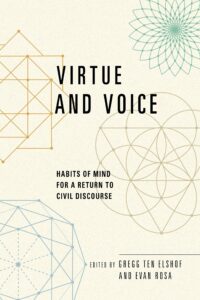 Virtue and Voice: Habits of Mind for a Return to Civil Discourse edited by Gregg Ten Elshof & Evan Rosa (Abilene Christian University Press) $24.99 OUR SALE PRICE = $19.99
Virtue and Voice: Habits of Mind for a Return to Civil Discourse edited by Gregg Ten Elshof & Evan Rosa (Abilene Christian University Press) $24.99 OUR SALE PRICE = $19.99
Oh my, just when I thought there were enough books on civility there is this. Wow. I’ve often said one hardly needs more than Richard Mouw’s splendid Uncommon Decency: Christian Civility in an Uncivil World (IVP; $20.00; our sale price at 20% off makes it $16.00.) I still think that Mouw is indispensable for anyone wanting to grow in convicted civility. It makes a great reading group study.
Virtue and Voice, though, is simply amazing, a major contribution, one of the most important books in this genre that has come out in years. It is a collected anthology of authors with a variety of angles of vision — they are ethicists, philosophers, historians, theologians and thought leaders of various sorts. Many of these (including the aforementioned Rich Mouw) have spent long years working on this topic and speak from both personal and professional experience and expertise.
The editors themselves are remarkable and remarkably astute in curating this volume for us. Gregg Ten Elshof wrote the fabulous, little I Told Me So: Self Deception and the Christian Life (not to mention a good book on Confucius for Christians.) Mr. Rosa is the assistant director of public engagement at the Yale Center for Faith and Culture where he works with Miroslov Volf.
The pieces here acknowledge that the current climate of contentious and ineffective civil discourse is troublesome but they also show how “the cultivation of intellectual virtues can renew our voices and heal the broken state of our public discourse.”
I am not sure that academics in a rare volume like this — vital and beautiful as it is — can heal the culture at large. But this is what philosophers and thought leaders do at their best; they become public intellectuals and use their scholarly chops to helps us dig deeper and learn some important stuff. It is a gift, a tool, a resource to help us think and cultivate some deeper approaches.
The important stuff on offer here is a deeper way to think about civility by linking it to virtue and, then, to this notion of intellectual virtue, drawing on Augustine’s notion of “rightly ordered affections.” Some who have heard me lecture on the formation of the Christian mind may recall (okay, it’s a long shot, but you might) that I love a book called Virtuous Minds: Intellectual Character Development written by Philip Dow (IVP; $20.00.) This new recent one, Virtue and Voice moves that notion further along in a very generative way. Our intellectualism has to be virtuous (shaped by traits such as honesty, curiosity, humility) and, here, these virtues must shape our public voices. Can we be public intellectuals that invite humility? Can intellectuals who speak out to influence the day also be marked by respect? Can we use our strong ideas in a way that invites people to a hospitable conversation?
The authors here range from Robert Audi to Christena Cleveland, from George Marsden (who here writes on C.S. Lewis) to Robert Roberts. There are people of various specialities, men and women, from evangelical Christian colleges and universities (Biola U., Grove City College) and Roman Catholic institutions (Notre Dame, Loyola at Marymount) and from secular state university settings. You’ve got to see Linda Zagzebski’s (of the University of Oklahoma) reflecting on “intellectual virtue terms” and linguistics and semantics.
I think I liked Christina Cleveland’s piece the best, but these hefty, intellectual essays are all astute and often inspiring. How we cultivate intellectual virtues both in the academy and the wider culture is an urgent question which should capture some of our BookNotes readers. We recommend Virtues and Voices: Habits of Mind for a Return to Civil Discourse and celebrate its contribution to the ongoing maturity of our witness.
Listen to the ever-wise, virtuous Lutheran leader and church historian and public journalist Martin Marty, who wrote a lengthy review. He notes,
Every day, hour, and minute, our personal experiences and the media demonstrate the incivility of public discourse in moral, political, and religious life. Not content merely to report on the public scene, these essays demonstrate the value of curiosity, attentiveness, open-mindedness, intellectual carefulness, and intellectual thoroughness… Civil discourse can make a refreshing difference. Virtue and Voice creatively dedicates itself to such discourse, and readers of this book who put any of its contributions to work in the larger society will find fresh ways to be intellectually virtuous.
 Love Your Enemies: How Decent People Can Save America From the Culture of Contempt Arthur Brooks (Broadside Books) $27.99 OUR SALE PRICE = $ 22.39
Love Your Enemies: How Decent People Can Save America From the Culture of Contempt Arthur Brooks (Broadside Books) $27.99 OUR SALE PRICE = $ 22.39
In July 2019 I did a BookNotes column highlighting several books on civility. This was one of the strong ones on that list and I want to remind you of it here, now. This is an edited version of my remarks from that previous BookNotes.
Wow, this subtitle alone should capture your attention and inspire you to want to start a book group, right? I have heard Mr. Brooks (no relation to David, by the way) at a Q Gathering once and know him to be kind and eloquent and thoughtful. The New York Times recently reviewed this in their Book Review section which indicates its seriousness and its importance. With great endorsements by Simon Sinek and Ben Sasse, cofounder of AOL Steve Case, and important and eloquent Roman Catholic author, Bishop Robert Barron, you might realize that this will appeal to readers from across the political and religious and cultural spectrum. When he warns us not to “weaponize” the values of others that we disagree with, but to treat them with understanding and respect, he’s speaking boldly and wisely. When he says we have more in common than we realize, he’s surely correct and, as you might guess, I love hearing that good news about common ground and such. (Alas, he seems to almost under-play our most serious differences, though. In fact, some of us really don’t have much in common. I appreciate the line from Os Guinness who years ago spoke of learning to live “with our deepest differences.”) Kindness and grace are hugely and urgently needed, now.
Love Your Enemies offers a grand proposal, warm-hearted and witty, patriotic but not ideological. It is a great read, and helps us learn to “disagree without being disagreeable” as the old saying goes. Can the sorts of values and virtues that shape decent folks actually play a role in the hard-scrapple world of legislation and activism? Can we be kind in our Facebook debates and still be taken seriously? Can we set aside our increasingly toxic contempt? These are really important questions and you will be a better person, I’m sure of it, by spending some time with this inspiring book. I think I need to re-read it now, post-election 2020 as my heart is broken from the rancor. Maybe, you, too, need these wholesome stories and this thoughtful reminder.
I find myself drawn to these elders from the right who perhaps now realizing they (yes, Mr. Brooks’s own think-tank) helped create some of the rancor in recent decades and might have some regrets about that. But Love Your Enemies isn’t a policy book, it is a thoughtful reminder for ordinary folks to “put our contempt aside and work together again.” He does it with a light tough, with joy even. Maybe this upbeat book will help us all be a bit unusual in this fractious environment, by being more warm-hearted and friendly. It’s not easy. This book can help.
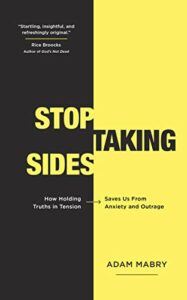 Stop Taking Sides: How Holding Truths in Tension Saves Us From Anxiety and Outrage Adam Mabry (The Good Book Company) $16.99 OUR SALE PRICE = $13.59
Stop Taking Sides: How Holding Truths in Tension Saves Us From Anxiety and Outrage Adam Mabry (The Good Book Company) $16.99 OUR SALE PRICE = $13.59
I’m going to say right from the start that I don’t like the title. I suspect it is inviting us to some pretty profound insights — drawing on science and psychology, ancient wisdom and Bible instruction, grace and gospel — and I am going to read it. The publisher does consistently clear-headed evangelical books (often from the UK.) Good folks have raved about this one with folks like apologist Rice Broocks calling it “startling” and Linda Allock (author of Deeper Still) saying it is “challenging stretching, and in some places quite uncomfortable.”
That is, this is not a simplistic call to kumbaya or even some neutral common ground. It is embracing a surprisingly refreshing solution to suspicions that plague so many of our heated discussions. It is, Mabry says, the key to growing in joy and virtue as we deepen our embrace of a Biblically authorized tension.
Stop Taking Sides emerges out of a solid, gospel-centered congregation in Boston (Aletheia Church) and the author is seeking, clearly, to help us love others well. It is, it seems, mostly a fairly in depth study of a theology of paradox, of balance, of tension. The Word and Spirit speak and in community we learn to hear God’s complicated through and to each other as well, not by siding quickly for and against, but with open-hearted humility. Of wanting both/and rather than either/or. (These are my simple ways of explaining it, although I’m not sure Mabry puts it that way.)
There are some charts and diagrams –a circle, wheel illustration that is in from time to time — that show out of the foolishness of saying nothing matters or resisting truth, to the unhelpful hardness of judgmentalism. It looks really good for those that want to think through the options and instincts, our ways of dividing up into tribes and sides. Scriptures often call us to hold things in tension and in this book, the author shows us how it’s done.
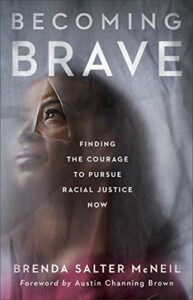 Becoming Brave: Finding Courage to Pursue Racial Justice Now Brenda Salter McNeil (Brazos Press) $21.99. OUR SALE PRICE = $17.59
Becoming Brave: Finding Courage to Pursue Racial Justice Now Brenda Salter McNeil (Brazos Press) $21.99. OUR SALE PRICE = $17.59
As much as I wanted to share the evangelical wisdom from The Good Book Company, above, about the art of holding various truths in tension, as I noted, I’m not sure fully agree with the title of that one. (Having not read it yet, it may be that the author nuances that admonition a bit. And, it may be that he means in side-talking schisms like church splits over doctrinal disputes. It is clear, though, that Biblical ethics and sound public theology leaves us no doubt that there are issues where we must take sides. We are called to love our neighbors and advocate for the poor and oppressed. And so, must be prepared to be wise allies of any who are marginalized or mocked (and it is clear that there is a lot of that going on these days, from some liberals dismissing those of conventional conservative values and our President mocking, well, almost anyone he doesn’t like.) Now is a time to learn how to stand up and speak out. Which, for some of us, will take the virtue of courage. This book by one of our fine evangelical leaders, known for books on evangelism and grace, reconciliation and multi-ethnic friendship, here moves us away from passivity to action. Becoming Brave is a powerful, generative, helpful study of the Biblical narrative of Esther.
Lisa Sharon Harper writes of it that
Becoming Brave declares that the Christian call to do justice cannot and shall no longer be guided, shaped, and defanged by sensibilities more loyal to white people’s comfort than to God.
Wow. This book is a must-read (as we have said before at BookNotes). This is an exceptionally important book and we highly recommend it. Order it from us today!
Look: racial injustice is a real problem (even though different folks, include different people of color, understand the problem differently and advocate for different sorts of solutions. There are many issues pressing upon us these days, and few think that this particular aspect of brokennes in our culture is the only one. But it is central to much that is wrong these days which is why we continue to promote many, many books on racism, white privilege, and the like. If you are going to read one title on this topic these days, this is an excellent choice, and will help you grow not only in awareness of the issues of race in our day, but will help you understand the book of Esther and help you fine yourself in the story of God’s redemptive work in broken, secularized cultures.
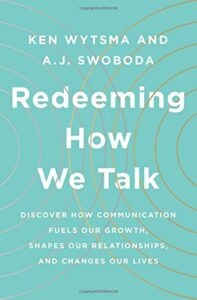 Redeeming How We Talk: Discovering How Communication Fuels Our Growth, Shapes Our Relationships, and Changes Our Lives Ken Wytsma & A.J. Swoboda (Moody Press) $14.99 OUR SALE PRICE = $11.99
Redeeming How We Talk: Discovering How Communication Fuels Our Growth, Shapes Our Relationships, and Changes Our Lives Ken Wytsma & A.J. Swoboda (Moody Press) $14.99 OUR SALE PRICE = $11.99
It is my conviction, and I hope yours, too, that in this post-election season, after months of serious allegations and draining debates (in the media and in our own personal circles) we now need to turn to the task of regaining trust, renewing goodness and beauty, repairing some things that have been damaged. In this BookNotes I’ve highlighted mostly recent books that might help us understand some of the demographics and philosophical issues in our current polarization. I’ve offered some books about speaking well in a climate of conflict, about living well in a time of fear. A few of the books have been heady and deep, others energetic about social repair. This is one that is as simple as it gets, but — like the best books we tend to most eagerly promote here at the shop — it is not cheesy, it is grounded not only in solid cultural awareness and Biblical theology. It is, so to speak, a self helpy sort of practical book that is reliable and wise and really, really useful. Further, I trust these authors — Wytsma has written excellent books as an evangelical on the topic of justice and he wrote one of the best books available on the topic of white privilege (The Myth of Equality.) (He has also written a fun little book on creativity and a wise, deeper one on the paradoxes of faith.) A.J. Swoboda, a hip pastor in urban Portland, is also a writer we adore — I’ve read his many books, including good work on eco-theology, his stellar book on Sabbath (Subversive Sabbath) and a luminous book on dark and doubt to be read during Holy Week. If anybody is going to be trusted to write a simple, self-help book that is reliable and deeply wise, it would be guys just like this.
And so. Are you, they ask on the back cover, “Tired of all the ranting?” In this little volume they offer a compelling case to stop the ranting, already, but to enter meaningful conversations. They lament the discord that seems as prevalent as ever — even online bullying and a sad sort of isolation that many experience. Redeeming How We Talk is a gem of a book that guides us to allow God’s own grace to shape and reform how we use our words. This a a strategy book, a reflection, a sermon on godly speech.
The book is arranged in two main units or parts. The first third is “The World of Words” and invites us to ponder what we mean by creativity, about propaganda, about the challenge of connecting in the digital age. They have a (very) brief history of information that is fascinating, and they offer colorful warnings (“Here Be Dragons”) to guide us well.
The next two-thirds are about “The Words of God” which asks what Godly speech really is, about wisdom in our use of words, about speaking a better word. This is Christ centered and Biblically-informed and yet offers really practical stuff — one chapter is called “The Mechanics of Hearing Each Other.” My, my.
Words can be harmful and words can carry blessing. This book is right in wondering if language itself is getting lost and is wise in inviting us to redeem it to its God-given beauty and healing purposes. With insight about silence, even, Redeeming How We Talk is loaded with really useful advise and faithful insight. It’s no wonder there are bunches and bunches of endorsements and raves from great folks who commend it. We do, too. Order it today.
In a world where we have tribalized ourselves into identity groups of disagreement, true conversation and dialogue are becoming obsolete. We don’t have conversations anymore; the dialogue is predetermined and reinforced in the echo chambers of media. A. J. and Ken have given us not only a history of how we got here and a theology of communication, but wisdom and practical guidance in how we talk to one another. It is time for us to leave our polarized islands of finger pointing and truly learn to ask the deeper questions, gain understanding, and yes, speak to one another in a way that reveals the love and wisdom of God. This book will give you the tools to heal our fractured world one conversation at a time. –Rick McKinley, Pastor of Imago Dei Community, Portland, OR, author of Faith for This Moment: Navigating a Polarized World as the People of God
What comes out of our mouths is a reflection of what’s on our hearts. At a time when our discourse has become more coarse and when it’s easier to back into corners with our opinions, rather than engaging with those with whom we may disagree, this book offers a way for us to rethink the importance of civil discourse, and humility and openness in communication. This book comes at a right time when perhaps all of us need a fresh reminder to guard our tongues and our hearts in a way that would honor Christ. –Jenny Yang, Vice President of Advocacy and Policy for World Relief, author of Welcoming the Stranger
We have become a people all alone, together,” assert Ken Wytsma and A. J. Swoboda in Redeeming How We Talk. Mass communication is more like a corporate cacophony. Few are listening, few speak what’s worth hearing. We just keep missing each other. Is there hope of recovery from the current crisis? Is there hope for the kind of communication that recovers the lost art of community? Wytsma and Swoboda blaze a path out of all the noise that moves toward honest, thoughtful communication where we can listen, hear, and thoughtfully respond. –Jerry Root Professor, Wheaton College author of The Neglected C.S. Lewis
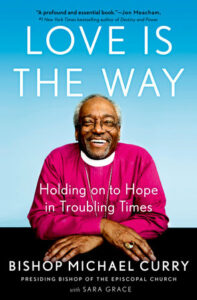 Love Is the Way: Holding on to Hope in Troubling Times Bishop Michael Curry (Avery) $27.00 OUR SALE PRICE = $21.60
Love Is the Way: Holding on to Hope in Troubling Times Bishop Michael Curry (Avery) $27.00 OUR SALE PRICE = $21.60
Well, if the upbeat Americana texts and sermons of the above-mentioned Becoming America doesn’t do it for you, maybe this more deliberately Christian book — offered by a public leader, increasingly known outside of his Episcopal church where he serves as Bishop — will be inspiring reading in these complex days. It is my sense we all need a boost, a reminder of our first principles, a call to reflect on what really we can do to help heal our broken land. Let me be clear: Curry is insistent: love is the answer. And we love because God first loved us. If God is love and the great commandment is to love others, well, the good Bishop is right: love is the way. Can we believe it?
Many know that Rev. Curry is a passionate and eloquent preacher. (Did you see that sermon he preached at the Royal Wedding a few years ago? Whew!) Here, he offers what Jon Meacham says is “a profound an essential book.”
Meacham continues:
At once personal and universal, intimate and sweeping, it frames the great question of our time–which is, really, the great question of all time on this side of Paradise–with passion and eloquence. Michael Curry, priest and bishop, plays the prophet in these pages, drawing on his own remarkable life to show us the way we might make our own lives, and the lives of nations, warmer, better, and nobler.
Listen to these other endorsers:
‘Perfect love casts out all fear’ (1 John 4.18). In this beautiful and moving book, Bishop Michael Curry reflects on the nature of God’s love and the reflection of that love in human lives. Drawing on his own life and experiences he shows us that, time and again, when love is threatened by circumstances — be it poverty, racism, violence, injustice or the abuse of power –t hat same love has the power to shine through. Two thousand years ago Jesus called together a small band of disciples to follow him in preaching the good news of God’s love. The movement we now know as the Church started off simply as ‘the way.’ Bishop Michael is convinced that, just as then, love and the message of love has the power to transform our world.– The Most Reverend and Right Honourable Justin Welby, Archbishop of Canterbury
Michael Curry believes in love. Not the kind of love that sidesteps and softens our response to the most brutal realities of our deepest, racist, economic, and human oppression. But rather, like Dr. King and, more importantly, Jesus said; the kind of radical love that may be the only thing that can finally overcome such radical sin. On a personal note, Michael is and does what he says about being a follower of Jesus and the way of God’s overwhelming and overcoming love. Love is the Way is moving, heartfelt, and extraordinarily important. In this fearful time, more than perhaps ever before, the world needs this book because, as Michael says, ‘Love dreams visions.’– Jim Wallis, Founder and President of Sojourners
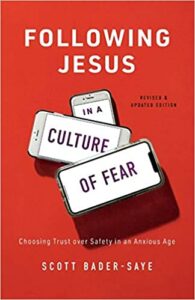 Following Jesus In a Culture of Fear: Choosing Trust Over Safety in an Anxious Age Scott Bader-Saye (Brazos Press) $17.99 OUR SALE PRICE = $14.39
Following Jesus In a Culture of Fear: Choosing Trust Over Safety in an Anxious Age Scott Bader-Saye (Brazos Press) $17.99 OUR SALE PRICE = $14.39
Funny, I picked up this new edition of a book we sold in 2007 and noticed that my friend Derek Melleby had a nice endorsing blurb on the inside. I pressed back the page gingerly to take a picture to show Derek his little moment of fame endorsing the first edition of this book drawn from a review he wrote in a journal called Engage. And then I noticed, right under my thumb, there was a blurb by me on the inside, too, from the Hearts & Minds Bookstore newsletter BookNotes, circa 2007. I raved about it then, and I can do so again, now.
In the years after 9-11 there were many fears — some legitimate and some overblown — that many held do. To counter that there were, among other voices, ads that said to “Live Fearless.” I still think that is dumb when I see BlueCross saying that on billboards to entice you to their healthcare plan. In a dangerous fallen world, there is much to be aware of.
As Bader-Saye explains, there is a timely and appropriate, faith-fueled view of fear. He’s not with the “fear not” camp of many Pentecostals and rather simplistic preachers. He’s not a hand-wringer, though, either. This book wonderfully explores a balanced and wise alternative to those two extremes. Interestingly, he is aware, now more than he once was, that it is in a sense an experience of white and middle class privilege to assume that many fears are overblown. As he says in the preface to this new 2020 edition, it struck him powerful as he was lecturing about the first edition of the book at a Mosque and he realized many of these Muslims were, in fact, not imagining that many hated them, that their lives were endangered. Most American’s in most cities were simply not under attack my jihadists. Most Muslims in American lived in fairly real fear.
And so, the author’s take on fear, what is reasonable and responsible, has evolved even as our culture has changed the scapegoats and names of those whom we fear. Fear now, the author realizes, has “taken an outsized role in our current cultural and political context.” There is more going on beneath our culture wars and each side, these days, fears the others. Following Jesus in a Culture of Fear is needed now and I am grateful for this updated revisioned version.
And yet, even in this freighted time and this updated edition, the book is very nicely down to Earth. He talks about movies, about parenting, about courage and recklessness, drawing from novels and lots of real life episodes and illustrations. It even has discussion questions to help groups work through it together.
I am not alone in this. Listen to this thick comment by Walter Brueggemann:
“Bader-Saye has written a timely and provocative book concerning Christian resources of faith in a culture besot by fear. His diagnosis of a pervasive system of anxiety, rooted in Enlightenment reductionism, is on target; but more important is his assessment of the capacity of communitarian courage to act as a transformative alternative to fear. Bader-Saye draws upon compelling contemporary cases of such courageous action but shows, with equally compelling articulation, how such courage finally is deeply rooted in God’s providence. His book is a bold theological exposition that has immediate and rich pastoral derivatives, all in the interest of an intentional church community acting congruently with its confession of faith.” —Walter Brueggemann
“In a culture consumed by anxiety and divided against itself, Scott Bader-Saye’s Following Jesus in a Culture of Fear couldn’t have come at a better time. Bader-Saye tackles the most pressing moral challenges of our day: the dangers of American exceptionalism, of stoking fear for profit, and of manufacturing fear of the stranger in our midst. Bracing in its honesty and inspiring in its call for a risky faith, Bader-Saye’s book offers readers biblical wisdom and well-founded hope for our turbulent times.” —Joy Ann McDougall, associate professor of systematic theology, Candler School of Theology, Emory University
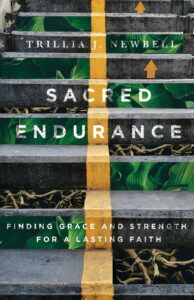 Sacred Endurance: Finding Grace and Strength for a Lasting Faith Trillia J. Newbell (IVP) $16.00 OUR SALE PRICE = $12.80
Sacred Endurance: Finding Grace and Strength for a Lasting Faith Trillia J. Newbell (IVP) $16.00 OUR SALE PRICE = $12.80
I hope you know this popular writer, a black woman who has been sharing a gospel-centered hope for racial unity and Kingdom living through many good books. Her book United: Captured by God’s Vision for Diversity came out in 2014 and she has done many since then. This summer she released a volume she edited, speaking about diversity and culture and friendship among a group of evangelical women friends — Beautifully Distinct: Conversations with Friends on Faith, Life, and Culture that shows her heart of crossing divides and building bridges, at least within a somewhat broader tribe. She is perhaps most well known for the spectacular kids picture book in the “Tales That Tell the Truth” series, God’s Very Good Idea: A True Story of God’s Delightfully Different Family. We already have some pre-orders for her February 2021 release Creative God, Colorful Us (Moody; $12.99.)
All this to say she has a heart for doing the hard work of racial reconciliation and has spoken well into the largely white evangelical subculture. One can imagine that this is draining at times, hard and sometimes painful work. She has learned, perhaps the hard way, what it means to take up the gospel call of sacred endurance. This book is a guide to what some might describe as the call to “keep on keepin’ on.”
There are chapters here about running God’s race, about Christ Himself in the “cloud of witnesses” and what sort of motivations we need to finish the race well. She is teaching about discipleship, spiritual formation, character formation and more, all to get us across that finish line without giving up. One great chapter tells how it happens: “The Heart Needed, the Strength Supplied.” Another excellent chapter is apropos for our cultural moment, called “Broken and Contrite.” Are we? Should we be?
I liked a chapter called “Enduring and the Mind.” The middle chapter six is called “Enduring in Society and the World.” She knows what it means to struggle and trust God, to (as with most serious races) “falling and getting back up.” She advises not to “go it alone” and she offers baby steps towards practical discipleship. Ms Newbell has learned to “look to the prize.” As a person well aware of the civil rights movement and other justice efforts rooted in the black church, she knows the layers of meaning of that very (Biblical) phrase. The first story on the first page of the book is one that is not as well known as it should be — about how Mahalia Jackson on August 28th 1963 encouraged MLK during what started out as a fairly tepid speech at the Lincoln Memorial. Yes, she has a deep awareness of the black church’s contribution to understanding our call to a race. As an evangelical writing a book about “pressing on” as described in Philippians 3:14, she shines, inviting us all to a full-orbed and robust sort of culturally-engaged discipleship.
I believe some of us need gospel hope and an extra reminder to keep our eyes on the prize, to run the race with endurance, to find through God’s grace the strength we need to keep at our various tasks in God’s Kingdom. Civic responsibilities and efforts for cultural renewal are part of that for most of us, and a book of basic Christian living with some solid teaching on endurance just might be what the doctor ordered.
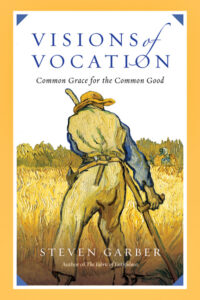 Visions of Vocation: Common Grace for the Common Good Steve Garber (IVP) $18.00 OUR SALE PRICE = $14.40
Visions of Vocation: Common Grace for the Common Good Steve Garber (IVP) $18.00 OUR SALE PRICE = $14.40
I find myself telling people about this book quite often as it is one of my all time favorites. I’m glad so many people this year ordered his smaller collection of short pieces — essays and reports from his travels and missional teaching all over the world — called The Seamless Life: A Tapestry of Love and Learning, Worship and Work (IVP; $20.00) as it is a beautiful and lovely and potent collection of Steve’s thoughtful reflections. It is an amazing little book and I can’t say enough about it. That phrase (“a seamless life”) says so much and perhaps in this season of rethinking our public lives and our cultural situation, a desire to be people of integrity — living out the same virtues and values and faith in our work-world as we doing in our worship, living out the same virtues and values an faith in our political lives as we do in our prayer lives — may be a starting point for a more coherent and integrated life.
That great notion and those essays in A Seamless Life came about (or so it seems to me) from the work Steve was given to do after he published his extraordinary Visions of Vocation. He went on the road, speaking at conferences, mentoring seekers, visiting particularly creative projects from San Diego to Beijing, from Eastern US to Eastern Europe. From years of seamless visioning consultations with folks as diverse as The Art House in Nashville and the Mars Corporation in Northern Virginia and The Murdoch Trust in the Pacific NorthWest and the Telos Group (working for peace in the Middle East) and the Made to Flourish Network to the Gotham Fellows out of Redeemer Presbyterian’s Center for Faith & Work, Steve has offered his heart and soul to projects and organizations he wants to encourage. All, it seems, name Vision of Vocation as a key book in their own growth into more coherent Kingdom living and a key resource for their own institutional longevity.
I think Visions of Vocation is important for a few key reasons right now. I have written about it often here at BookNotes so I will be concise. Three things about it call out to me now, compelling me to invite you to consider it in this cultural moment.
Firstly, Visions of Vocation does explain and value “the common good” so it is a book about loving our neighbors well, about working for the renewal of the social architecture of our culture, for institutional reform and Godly repair of our hurting world. His vision as a “mere Christ” influenced early on by Francis Schaeffer, is that God cares about every area of life and every aspect of society. He gets it that in God’s common grace, God upholds our fraying social fabric and cares about the whole of creation. I like so much that Steve refuses to compartmentalize faith as if it is private or only personal. If we are to endure as breach-menders, we have to have that sense of a call to the world, for the world.
Secondly, Garber’s book, without being melancholy or negative, includes an honest lament for the state of the world. Without being partisan, he knows and cares deeply about the wounds of history, about our own shame and hurt, how we are all, as Schaeffer put it, “glorious ruins.” Here’s the point: God loves us anyway. And, therefore, we must somehow take God’s own cue and find ourselves also loving the world (as it is) as God does. Can we accept our own human responsibility to mirror God’s mercy in a world of need? Can we be gracious and good toward it, knowing what we know? Can we be honest about our own responsibilities, knowing we are (as he fleshes out in a remarkable chapter) “implicated.” This is a major contribution for those of us wanting to embrace this work, and Visions of Vocation is a primary text to help us. Many have told us it is the most important book they have ever read.
Thirdly, Garber invites us to run with joy because we do hear God’s voice — vocare is the Latin root of the word “vocation” — and therefore, we can have hope. We do not have to grow jaded. We do not have to yield to cynicism. We can love as God so loves and thereby be people of hope. He says it so well, with such nuance and eloquence and intellectual substance, and that’s one of the sturdy, strong points. Who among us who cares about this world has not been tempted to cynicism or worse?
Here is a bonus point, a key takeaway in one chapter that some say is worth the price of the whole book. Steve talks about what he calls “proximate justice.” That is, we do not have to be “all or nothing” utopians. We must learn to live with some approximation of goodness and beauty, pushing always for the actualization of God’s many desires for the world, but not demanding more than our time in history can embrace. That is, he shares an insight of the old Dutch Christian statesman, Abraham Kuyper, who did not favor revolutions that tossed out too much with too many ideological hopes that then become their own soon to topple idols. That is, we must be visionary and hope for the best, but learn “how the sausage is made” and move as best we can, seeking God’s ways, glad for any move in the right direction. Such an understanding replaces optimism with hope and allows us to be grateful for small victories. Again, I am paraphrasing and you simply must read VoV for yourself to grapple with ideas such as “proximate justice.” It will help you not only survive, but find you own voice in these trying times of rebuilding and renewal.
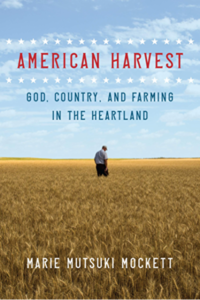 American Harvest: God, Country, and Farming in the Heartland Marie Mutsuki Mockett (Graywolf Press) $28.00 OUR SALE PRICE = $22.40
American Harvest: God, Country, and Farming in the Heartland Marie Mutsuki Mockett (Graywolf Press) $28.00 OUR SALE PRICE = $22.40
If some of the cultural crisis we face these days come from the difference between what some pundits call the coastal elites and the heartland, between urbane sophisticates that are largely anti-Christian and rural and small town folks who are, in fact, deeply religious, how can we get over these huge divides. (I’ve previously reviewed at BookNotes a small book that packs a wallop of insight called Not From Here: What Unites Us, What Divides Us, and How We Can Move Forward Together by Brandon J. O’Brien (published by Moody Press; $13.99) that offers uniquely Christian insight to the complexities of how our places effect us.) If we want to find new abilities to have better conversations about the things that matter most in this big land that is home to so many different kinds of people, this large story might point us towards real, live examples. American Harvest was one of my favorite books of 2020 and I can’t say enough about it in this small space, here.
(If you subscribe to The Christian Century you might have been fortunate enough to read the April 2020 book review of American Harvest penned by Valerie Weaver-Zercher which was one of the most beautiful book reviews I think I’ve ever read. It is unfortunately behind the paywall at CC but it was a fabulously, insightful, and gorgeous piece of writing.It was such a good review it discouraged me from trying to explain why I loved American Harvest so much.)
Another fine review that explores the heart of the book was in the Los Angeles Times a piece entitled “Meet the Heartland Evangelicals Who Feed America.”
Here is this summary of this memoir-like, creative non-fiction, journalistic report by Marie Mutsuki Mockett and why I think it carries hope for our polarized world. Mockett is an urban elite, intellectual, urbane, concerned about GMOs eats organic, un-religious, science-based, progressive, multi-ethnic. Her family has owned a large wheat farm in the mid-West which other peopel care for. For a variety of reasons he decided to go along with the migrant wheat harvesters who sweep with their giant combines from Texas to Montana each summer, living on the road,learning what these modern-day farmers do as they harvest the giant wheat fields. She embeds herself with a group of mostly young harvesters and learns their way of life, taking in rodeos in Texas, hunting wild pigs, eating at diners, fixing the machines, and doing hard, hard work in the extraordinary fields of Kansas and Nebraska and more.
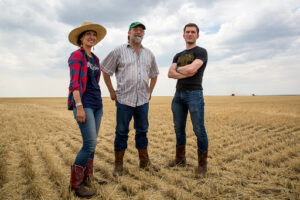 What more, you ask? She goes to church with them. You see, the outfit that she embedded herself with is a group of mostly conservative Mennonites from Lancaster County, PA. They are more or less kind to her, and she to them, and she is befriended, surprisingly, by a few who aren’t as fundamentalist and strictly plain as some conservative Mennonites are. They get her tuning in to The Liturgist podcast and she listens as they debate the theology found in Rob Bell books. (Nope, I didn’t see that coming!) These are socially conservative men and women who know the land and have little awareness of why city-slickers would care about eating organic. She can’t believe some of them take Genesis literally. She is distressed by what she sees as religious arrogance among some of the preachers they encounter. As person of color of Asian descent, she is sensitive to matters of ethnicity but rarely sees people of color anywhere in the months they travel. She is surprised at how warm and caring the harvesters faith community can be, but is alarmed at their misunderstandings of issues of great concern to her friends back in California. She’s a hard worker (and a fine writer) and has produced a remarkably American book.
What more, you ask? She goes to church with them. You see, the outfit that she embedded herself with is a group of mostly conservative Mennonites from Lancaster County, PA. They are more or less kind to her, and she to them, and she is befriended, surprisingly, by a few who aren’t as fundamentalist and strictly plain as some conservative Mennonites are. They get her tuning in to The Liturgist podcast and she listens as they debate the theology found in Rob Bell books. (Nope, I didn’t see that coming!) These are socially conservative men and women who know the land and have little awareness of why city-slickers would care about eating organic. She can’t believe some of them take Genesis literally. She is distressed by what she sees as religious arrogance among some of the preachers they encounter. As person of color of Asian descent, she is sensitive to matters of ethnicity but rarely sees people of color anywhere in the months they travel. She is surprised at how warm and caring the harvesters faith community can be, but is alarmed at their misunderstandings of issues of great concern to her friends back in California. She’s a hard worker (and a fine writer) and has produced a remarkably American book.
Three cheers for these Red-state, God-fearing, country-living, farm women and men, on the road in the mid-West. Three even bigger cheers for Ms Mockett for stretching out of her comfort zone and opening her mind and her heart to these Christian blue-collar folk. Three cheers for American Harvest for grappling with politics, gender, race, economics, religion, Native American history, agriculture, ethics, and friendship amidst huge differences. All of them sweating under the same blazing sun and hosting the same fearsl that the crops this year might not be profitable enough, united them in a way. Their desire to understand each other was not naive. As one reviewer said, the book is “an extraordinary feat of empathy.”
That so many have raved about this beautifully written travelogue makes me think that many hunger for an experience of cross-cultural friendship of this sort. The places it has been reviewed are diverse and the sorts of reviewers are fascinating to me. On the back cover alone there are lovely endorsements from Annie Dillard (who calls it a “doozy”) and Francis Spufford and Susan Cheever.
Enjoy these good words about this good book:
Marie Mutsuki Mockett has the kind of deft touch with the English language that would make me read a book by her, no matter what it was about. . . . At the end of the trip, Mutsuki Mockett bemoans the fact that she wants her ‘old self to reappear’–but it won’t. The Midwest has changed her. That, perhaps, is her greatest talent: the willingness to examine, even abandon, her own biases before she casts stones. That’s a lesson in empathy that we can all learn from, in the time of coronavirus, in the time of presidential elections–and beyond.” —Financial Times
“A patient, radiant, kindly book that in its own way determinedly adds a brick to the shining city on the hill where Americans will understand each other.” –Francis Spufford
“Marie Mutsuki Mockett describes the American plains as having ‘a subtle gradation in topography that suits a ruminating mind, ‘ and the same can be said of her stunning new book. . . . Her insights are ones we could all stand to learn from right about now.”– John Jeremiah Sullivan
“In the best tradition of travel literature, American Harvest is a discursive odyssey, an exploration of self, others, faith, and a landscape of terrible beauty.” –Randall Balmer
“Marie Mutsuki Mockett’s American Harvest is a book about this country unlike any other. Mockett’s account of the harvest is riveting, and the way she navigates her own plural identity as she travels with the combines is brilliant. This is a stunning, astonishing accomplishment.” –Susan Cheever
“An extraordinary feat of empathy set against a land of reds, whites, and blues, American Harvest doesn’t just speak to the great divide–it dares to bridge it.” –Marlon James
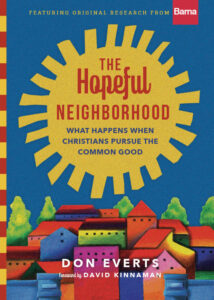 The Hopeful Neighborhood: What Happens When Christians Pursue the Common Good Don Everts (IVP) $17.00 OUR SALE PRICE = $13.60
The Hopeful Neighborhood: What Happens When Christians Pursue the Common Good Don Everts (IVP) $17.00 OUR SALE PRICE = $13.60
This splendid, little hardback is the third in a series, preceded by The Reluctant Witness: Discovering the Delight of Spiritual Conversations and The Spiritually Vibrant Home: The Power of Messy Prayers, Loud Tables, and Open Doors both which were funded in cooperation with The Lutheran Hour and were lively, upbeat summaries of research done by the Barna Group. The first showed that there is data indicating that folks aren’t necessarily opposed to spiritual conversation and offered insights about how to best engage in these sorts of conversations about deeper things. The second offered the data from surprising research showing that the most happy homes are the ones that are the most hospitable — and, in fact, messy. According to the findings shown in, The Spiritually Vibrant Home, extended families and house guests and complicated living arrangements can be generative and good. These were short reads with good charts and infographics and sidebars alongside a solid, engaging narrative. We recommend them both.
This new one, The Hopeful Neighborhood, though, is really, really great. Barna head David Kinnaman writes in his great foreword, “This book does such a beautiful job of preparing us for life on mission with Jesus in the place where we live and with the people who live near us, in our neighborhoods.” It is something many of us think about and we surely are thinking about it more now in November 2020. Everts is a really clear and compelling writer, a great storyteller (and he tells some good ones!) Drawing on original research from Barna, The Hopeful Neighborhood shows just what people are thinking, worried about, hoping for when it comes to community engagement. Informed by a solid missional theology, this gets down to brass tacks and would make a great study book for your civic group, Bible study, or Sunday school class.
The first chapter “Pursue the Common Good” invites us to “the shared work of all humans” and lays a great foundation. I love the “Use Every Gift” slogan that serves to invitee us to the process of blessings our neighborhoods. Chapter three insists that we “Love Everyone Always” and explores “the power of grace in tough seasons.” Of course we “give God glory” as we promote Christ’s ways; the last section is on experiencing “the hope of uniting around a common good” which they call in upbeat lingo, “joining the revolution.” As you might guess, I like this a lot.
Are we going to bridge the divides that have polarized our land, find some higher ground and work as salt and light in a fractured world? This little book invites us to care, and to care for our own places.
The Hopeful Neighborhood is a critical read for anyone desiring to rebuild the social fabric of our communities. Change won’t come from institutional leaders but from those on the street willing to do the hard work of listening, honoring our commonalities, and advancing good. — Gabe Lyons, president, Q Media, author of Good Faith.
BookNotes

